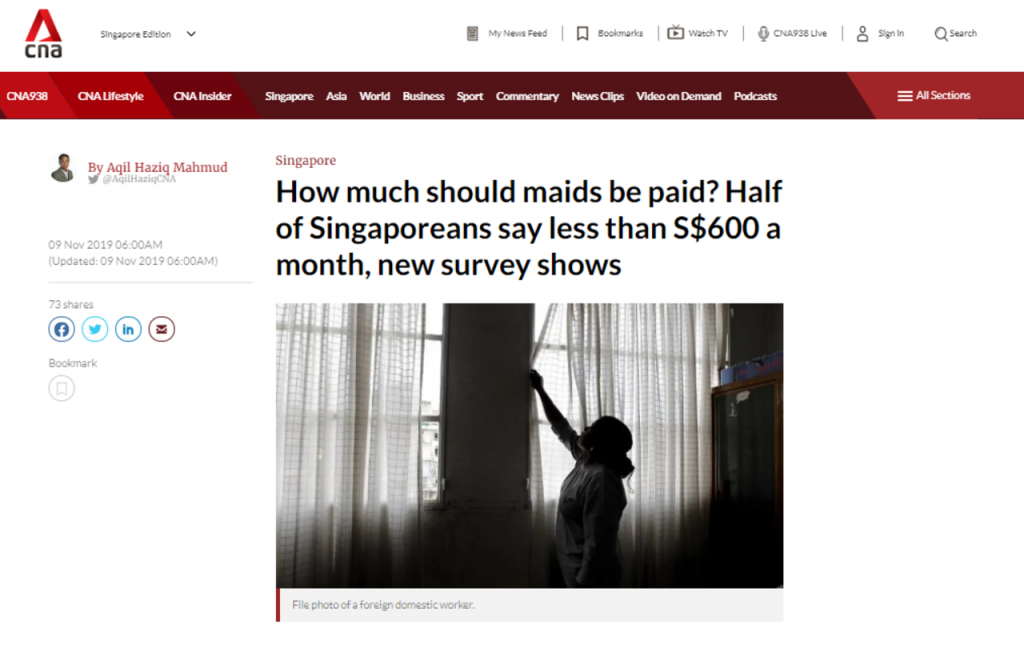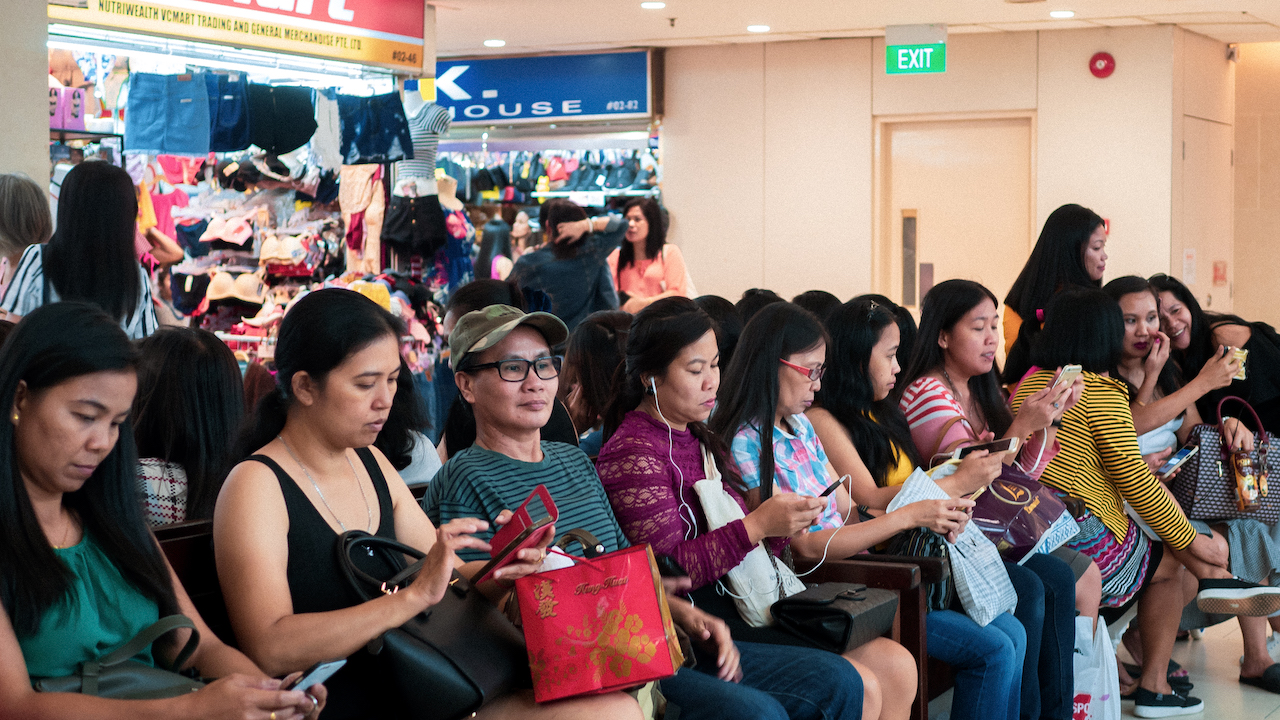Top image credit: Rice file photo/Zachary Tang
This raised a couple of eyebrows, but on the whole, nobody was that surprised. My boss’ neighbours are French.
This anecdote captures a commonly held perception: that expat employers are more progressive and generous than local ones.
Amongst other things, they are generally known to pay their domestic workers better salaries, give them more days off, and respect their privacy and independence. (‘Expat’, problematic term that it is, is also generally taken to mean ‘ang moh’, although this isn’t a strict definition. The belief applies as long as an employer is from a ‘Western’ country, even if they aren’t Caucasian.)
Cumulatively, this has created a perception that expats are just better employers to work for—hence the stereotype of the ‘ideal ang moh employer’. It endures not just amongst domestic workers, but amongst locals who, from their own observations, can guess at why.

All of them firmly agreed that domestic workers perceive foreign employers as being ‘better’, and would prefer to work for an expat family. Their stories also suggested that the stereotype has some basis in truth, as stereotypes often do.
At the extreme end, the archetypical domestic worker/expat employer dream experience is exemplified by Bhing, 46, who currently works for a Dutch family.
Bhing tells me that her employers, by any measure, are “really good”. She is paid $950 a month, plus a yearly Christmas bonus. (To put this in context, Singapore does not impose a minimum wage for domestic workers, although the Philippines’ government stipulates that they should be paid at least S$570. Last month, just under half of respondents of a YouGov survey felt that domestic workers should be paid less than S$600 a month.)
Her employers have taken her with them on trips to the Netherlands, and also pay for her to visit her family in the Philippines three times a year. She is free to rest or attend to her own tasks when she has completed her household chores, and has no curfew on her days off (every weekend, plus public holidays).
When it comes to grocery shopping, her employers give her free rein over the budget, and don’t ask for receipts. They are also very supportive of her interests and hobbies; Bhing volunteers for the Humanitarian Organisation for Migration Economics (HOME) and the National Gallery, and sometimes gives presentations and media interviews. When these arise, her employers actively ask her how things are going, and do their best to accommodate her schedule.
“They are really flexible. So I do everything to make up for this, like come back early on some off days. It’s all about compromise. They trust me, I trust them.”
Bhing’s experience is unusual, even by ‘expat employer’ standards, but the gist of it was echoed by Novia, 42, an Indonesian domestic worker who has worked for both local and foreign families. Although her salary isn’t as high ($700), she claimed to find her expat employers “more friendly and open-minded” than local ones, respecting her free time and private life.
By contrast, her experience with her first employer, a Singaporean, was less enjoyable.
While she was given enough food and rest, not physically or verbally abused, and generally treated well, she felt she was still being exploited. Her employer’s mother would take her to her other children’s houses to do the cleaning (with no further pay), and she was not allowed to use her mobile phone or have a day off. She was also, she claims, “not allow[ed] to talk with other people. Especially other DWs.”

My interviewees were quick to confirm that the ‘expat employers’ stereotype still endures amongst domestic workers, but they were equally quick to insist it is a vast oversimplification.
Every one of them stressed that a domestic worker’s experience depends on the individual case, and that local families make just as good employers as foreign ones. Bhing, for instance, spent her first 11 years in Singapore working for two local families, both of whom she loved.
“Both were very nice to me, I had no restrictions. The weekly day off was not mandatory yet, so I only had two days off a month and a curfew. But they were flexible. For example, if I said I wasn’t feeling up to cooking one day, my employers would buy food instead. I could eat in front of the TV or sit with them at the table. They treated me like part of the family and even told me about their problems.”
Leizle, 40, who currently works for a British family, was similarly effusive about the local family she had previously worked for. Like Bhing, she considers herself lucky; her ex-employers, whom she stayed with for 8 years, encouraged her to join them for meals, took her on family holidays, let her mother stay with them when she visited Singapore, and even visited her family in the Philippines.
As volunteers with HOME’s helpdesk, the women confirmed that they also encounter complaints about expat employers. (These are vastly in the minority, but might simply be due to how local employers outnumber foreign employers many times over.)
Although these almost never extend to physical abuse or withheld pay, they explained that complaints about foreign employers generally concern them being overly demanding or setting unreasonable standards.
For example, Bhing told me about an experience she had with a Swiss family.
“After I finished working for my last local employer, I thought I would try working for an expat family because all my friends wanted expat families and said they were good. It was a nightmare.”
Although the terms of her employment were a bit more generous, they were very strict.
“I was very excited during the interview, but when I began working for them, it was very different. They didn’t allow me to sit on the living room couch, and when they went out on weekends I had to wait up for them until 2:00 AM. I was also only allowed to eat by my room, just outside the kitchen. It was totally different from my local employers.”
Novia and Leizle also pointed out that the kind of work performed for expat and local employers can differ, leading to different expectations being set. Local families tend to engage domestic workers to look after young children and/or their ageing parents, while expats virtually never request help with eldercare.
Leizle also suggested that based on her and her friends’ experiences, local employers can be more accommodating of a new worker. “Most local families are willing to teach you when you are new, but some expat employers have very high expectations from you that your service is 100%.”
But on the whole, she felt it really “depends on the family who you work with. In my own experience, and what I hear from other domestic helpers, not all expat families are good. It can be very bad too. And local families are not all bad. Some can be very good.”

“From our professional point of view, there are a lot of great local employers and great expat employers, and we don’t really see a difference at our level,” said David.
“In fact, if a woman comes to us and says, I want to work for an ang moh, that’s a red flag. Complicated cases come up with both types of employers … it’s not a matter of nationality or origin.”
Moreover, he pointed out, the women who work here longest—the stories you hear about domestic workers spending up to 20 years with one family, practically raising their children from infancy—are almost always with local families, as expats rarely spend more than a few years here.
In summary: not all foreign employers are good, and not all local ones are bad. At the end of the day, the ‘dream expat employer’ is no more than a stereotype, and there’s no getting away from this.
This said, the full picture is a little more complicated. In particular, my interviews raised a few notable observations about our changing attitudes towards domestic work, and what we consider humane and dignified working standards.

Singaporean employers, for the most part, abide by the law and MOM’s hiring guidelines. According to my interviewees, they generally respect the mandatory day off, give their domestic workers adequate food and rest, allow them to use mobile phones, and pay them wages that, while not high, generally adhere to market rate. The vast majority want to be decent employers with a happy worker in their home, and do not physically abuse them or demand to know every intimate detail of their private life.
However, this is not a particularly high bar.
No one would ever praise their boss simply for following the law and doing the bare minimum. The real difference between a tolerant employer and an understanding one is this: seeing employees as full people with lives, concerns, and interests outside of work, and treating them with understanding and generosity, not merely as productive units of labour whose lives can be dictated by the boss.
After all, no one would stand for it if our bosses demanded to know who we were going out with, told us we couldn’t eat till they’d had lunch, or stopped us using our mobile phones at work. (The mobile phone issue is particularly pertinent for domestic workers, as their only lifeline to families and loved ones who are literally thousands of miles away.)
As Leizle put it, “[A]lthough I have no big issue with my local employers, I can feel the difference [in] how local employers and expat employers treat us.”
For example, if she makes a mistake, her expat employers will tell her what she’s done wrong, but in a way that “makes me want to respect them more,” rather than simply berating her (or even scolding her in public).
“They also teach the kids about basic manners, even towards the domestic worker in the house.”
I asked Yanti, a 38-year-old worker from Indonesia who currently works for a local family, what makes her feel respected and appreciated.
“Having my own room. My employers support me taking photography courses with HOME, because they know I want to be a photographer. If they are angry and scold me, afterwards they will say sorry. They give me rest time in the afternoon. At night they will not bother me, will not come to my room and ask. Just text me only.”
In other words: they know how to compromise, respect her right to a life outside work, and mind their own business.

I asked David what the top requests he gets from domestic workers are. He told me that the second most common is for an ‘ang moh employer’. The first is that they want to be treated like family.
This was echoed by every single one of my interviewees. All of them, when speaking about employers they loved and loved working for, mentioned that they had been treated ‘like family’. (Many adult millennials who, like myself, were virtually raised by domestic helpers, would probably want this too.)
This, of course, is understandable. To speak of being treated ‘like family’ conjures warm, fuzzy feelings, and suggests enduring relationships of deep affection, respect, and trust. The problem is that this doesn’t always sit well within the boundaries of a working employer/employee relationship.
Families, as we all know, are complicated. To be part of one is to make and be asked to meet demands, a process which always blurs the lines between love and obligation. This becomes especially problematic in the context of domestic work, with the further muddling of the work/home (or public/private) divide and the unique power imbalance it entails.
Let’s imagine a hypothetical employer who often comes back late at night due to work, around 10:00 PM, but still requests to have dinner waiting when he or she gets home. For the domestic worker, this means waiting up for her employer to finish dinner, and then washing up and putting everything away, by which time it would be close to 11:00 PM. (She also has to get up early in the morning, at 5:30 AM, to prepare breakfast before the children leave for school.)
To be sure, many mothers do all this and more, and are not compensated for their time or effort (not that they would necessarily want to be). But this isn’t the case with domestic workers who are, first and foremost, providing their labour in return for pay.
What, then, would treating the domestic worker in such a case like ‘family’ entail?

None of this is to say that domestic workers should not be treated like family, or that this is wholly undesirable. Rather, what domestic work asks of everyone involved is a delicate, never-ending negotiation: recognising that a domestic worker can both be intimately acquainted with every part of her employer’s home life, but still need to have certain professional boundaries respected. (To some extent, my interviewees suggested that expat employers—for all their friendliness and generosity—might be preferred because they acknowledge these boundaries. For example, many don’t expect their domestic workers to be ‘on call’ after 8:00 or 9:00 PM, after the family has had dinner.)
This is a tricky balance to find. Ultimately, however, it has nothing to do with being local or foreign, growing up amidst the domestic work system, or coming from countries with a robust labour rights framework. It’s about trying to be the most decent, generous, and compassionate people we can—something all of us, wherever we come from, have an interest in.
Do you believe in treating domestic workers like family? Whatever your thoughts, send them our way at community@ricemedia.co.







